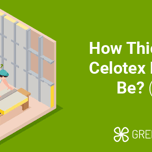Answer these simple questions and we will find you the BEST prices
Which type of solar quotes do you need?
It only takes 30 seconds
100% free with no obligation

Get Free quotes from insulation specialists near you

Save money by comparing quotes and choosing the most competitive offer

The service is 100% free and with no obligation
- GreenMatch
- Insulation
- Insulation Materials
- Icynene Insulation
Icynene Insulation: What Is It, Pros and Cons & Costs (2024)

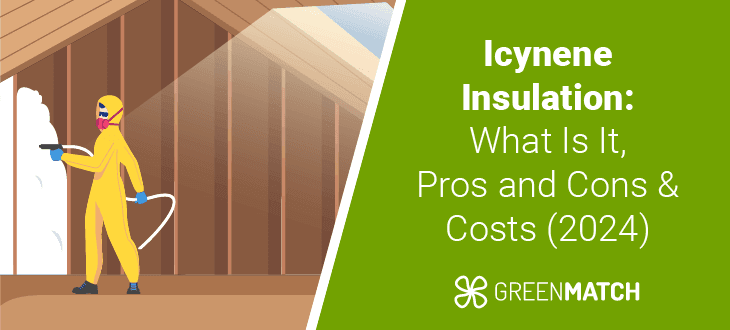
- The cost of Icynene insulation typically ranges from £20 to £70 per m2, depending on the type of foam, its thickness, and the size of the insulated area.
- As an eco-friendly alternative to traditional spray foam, Icynene uses a water-blown application process that eliminates the need for harmful chemicals.
- With an R-value of 3.7 to 7 per inch, depending on the type, Icynene insulation offers outstanding thermal efficiency and airtight sealing for your home.
Icynene spray foam insulation is becoming popular among homeowners and businesses looking to enhance energy efficiency and comfort. Unlike traditional insulation materials, Icynene prevents heat loss and creates an airtight seal that minimises drafts, reduces energy bills, and improves indoor comfort throughout the year. What truly sets Icynene apart is its eco-friendly, water-blown technology, which avoids harmful chemicals and provides a safer, more sustainable insulation solution.
Icynene offers versatile options for various applications, whether you’re insulating your roof, loft, or walls. Open-cell and closed-cell varieties can provide soundproofing and breathability or superior thermal efficiency and moisture resistance, depending on your project needs. While its innovative properties offer significant benefits, it is essential to understand its costs and pros and cons to determine if this insulation is right for you.
This article will explore what makes Icynene insulation unique. We will also break down the costs, advantages, and potential drawbacks to help you make an informed decision. Whether you plan to upgrade your home’s insulation or start a new project, this guide will provide the necessary insights. Keep reading to learn more!
Ready to upgrade your home with Icynene insulation? Let GreenMatch make the process effortless. We take the hassle out of finding the best insulation specialists in your area—completely free of charge. Fill out our quick 30-second form, and we’ll connect you with up to four free quotes with no hidden fees or obligations. Click below to learn more!
- Describe your needs
- Get free quotes
- Choose the best offer
It only takes 30 seconds



What is Icynene insulation?
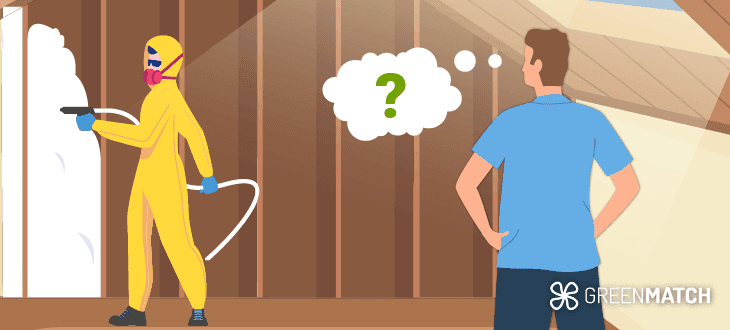
Icynene is a spray foam insulation made from polyurethane, much like traditional spray foam. However, it distinguishes itself as a safer and more environmentally friendly option. Its water-blown application process eliminates the need for harsh chemicals. Offering a non-toxic alternative that allows you to return to your property within two hours. This is significantly faster than the 12 to 24 hours required for traditional spray foam. Some Icynene formulations also incorporate low-VOC (volatile organic compound) technologies, enhancing indoor air quality.
It is renowned for its thermal performance and eco-friendly attributes. Icynene is designed to create a seamless air barrier to boots energy efficiency which can last up to 30 years. Applied as a liquid, it rapidly expands to fill gaps, cracks, and hard-to-reach spaces, offering a more effective solution compared to traditional materials like fibreglass or rigid foam boards.
Icynene expands up to 100 times its original volume upon application, forming a flexible foam that tightly adheres to surfaces. This property can seal even the smallest crevices, reducing air leakage and enhancing insulation performance. The foam is available in two types: open-cell, which provides breathability and soundproofing, and closed-cell, which offers higher R-values and moisture resistance.
Its ability to improve energy efficiency, prevent drafts, and maintain consistent indoor temperatures, combined with its sustainable, water-blown technology, has earned Icynene prestigious certifications such as BBA, IAB, and ETA, making it a top choice for modern insulation needs.
What are the different types of Icynene foam insulation?
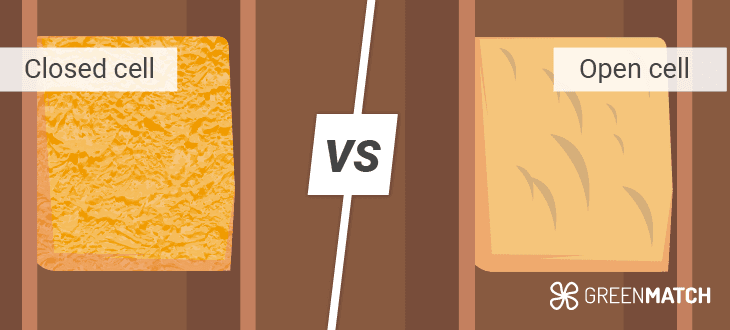
Icynene foam insulation is available in two types of insulation: open-cell and closed-cell, each with unique benefits and limitations. Understanding their differences is key to selecting the right option for your project.
Open-cell Icynene spray foam is a popular choice for residential projects, particularly insulation for roofs, lofts, and walls. Its flexibility allows it to expand and conform to irregular surfaces, enabling air and water vapour to pass through. This breathability helps reduce the risk of moisture-related issues like trapped condensation or mould. While its R-value is lower, around 3.7 per inch, it still provides effective insulation when applied in sufficient thickness. Open-cell foam is also more affordable, making it a budget-friendly option for homeowners. However, it is not water-resistant and is unsuitable for areas prone to high moisture or flooding.
Closed-cell Icynene spray foam features a denser, more rigid structure, making it ideal for demanding applications such as insulation for roofs, walls, and commercial buildings. With an R-value of 6 to 7 per inch, it delivers superior thermal insulation, reducing energy costs and enhancing indoor comfort. Its rigid nature creates a vapour barrier, offering excellent protection against water infiltration, mould, and mildew. Additionally, it reinforces structural integrity, making it perfect for basements, crawl spaces, and exterior walls. Though more expensive and less flexible than open-cell foam, closed-cell foam excels in durability and performance, making it the best choice for heavy-duty insulation areas.
Where is Icynene spray foam insulation typically applied?
Icynene spray foam insulation is a versatile solution widely used in residential and commercial applications. It is particularly effective for lofts and roof insulation, creating an airtight seal that reduces heat loss and improves energy efficiency. You typically apply this material to walls, crawl spaces, and attics in your home, as its expanding nature allows it to fill gaps and hard-to-reach spaces, ensuring comprehensive coverage.
Closed-cell icynene is preferred for areas with high moisture exposure, such as basements or exterior walls, due to its water resistance and vapour barrier properties. In contrast, open-cell Icynene is well-suited for interior walls and ceilings, offering excellent soundproofing and breathability.
In commercial buildings, Icynene spray foam is often applied to roof structures, warehouse walls, and storage facilities, where its durability, thermal efficiency, and ability to reinforce structural integrity provide long-term performance benefits.
Pros and cons of Icynene spray foam insulation
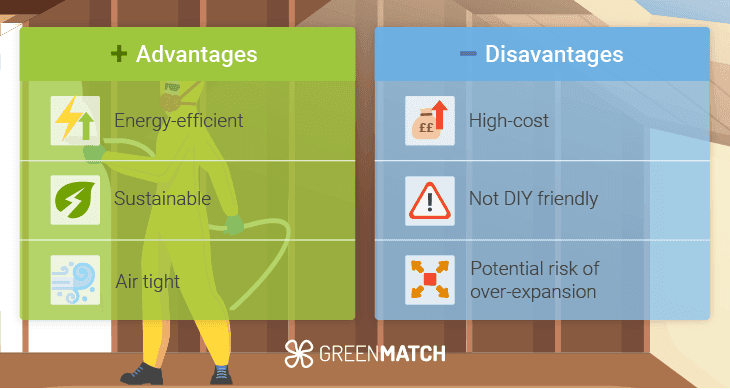
Understanding the pros and cons of Icynene insulation is essential to determine if this material suits your needs. You can make an informed decision by weighing out the pros against icynene insulation problems. Here are the pros and cons of Icynene insulation:
Pros
- Thermally efficient: Closed-cell foam offers an R-value of 6-7 per inch, while open-cell foam provides around 3.7 per inch. Both are effective in reducing heat loss.
- Airtight: Creates an airtight barrier, reducing drafts and improving energy efficiency.
- Water resistant: Closed-cell foam acts as a vapour barrier, preventing water infiltration, while open-cell foam allows breathability to reduce condensation issues.
- Sustainable: Water-blown formulations reduce the use of harmful chemicals, with low-VOC options improving indoor air quality.
- Flexible: Expands to fill gaps and irregular spaces, ensuring comprehensive coverage.
- Longevity: Durable and long-lasting, providing consistent performance over time.
Cons
- Cost: More expensive upfront than traditional insulation like fibreglass or mineral wool.
- Not DIY friendly: Icynene insulation requires professional application, increasing its overall cost.
- Rigid nature: Closed-cell foam is less flexible, making it unsuitable for surfaces prone to movement.
- Over-expansion: If improperly installed, Icynene can expand too much, pushing out drywall studs and damaging your home.
- Moisture issue: Open-cell foam is not moisture resistant, without adding a vapour barrier before installation, you may increase the likelihood of mould and mildew growth.
Working with qualified professionals is crucial to ensure a smooth and problem-free installation of your Icynene spray foam insulation. Comparing multiple quotes is a great way to find the best insulation installer in your area. However, this process can be time-consuming and may yield limited results.
At GreenMatch, we simplify the search by offering up to four free quotes from trusted local Icynene insulation installers. Fill out our quick 30-second form to receive your quotes promptly. Click below to learn more!
- Describe your needs
- Get free quotes
- Choose the best offer
It only takes 30 seconds



How much does Icynene insulation cost in the UK?
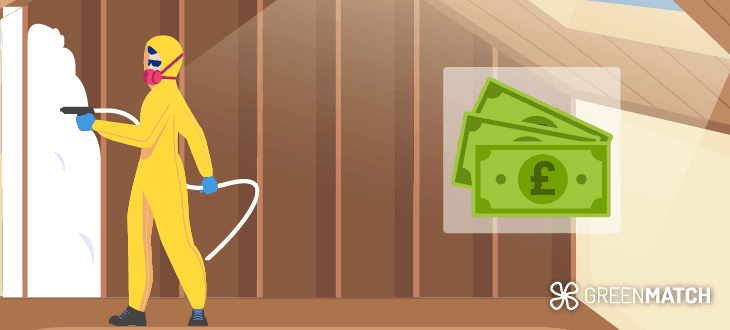
Understanding the cost of Icynene insulation in the UK is crucial in determining whether it’s the right choice for your needs. On average, Icynene insulation costs range from £20 to £70 per m2, depending on the thickness and size of the insulated space. The type of Icynene foam you select also influences the price, with average costs as follows:
| Icynene type | Average cost per m2 |
|---|---|
| Open-cell | £55 per m2 |
| Closed-cell | £70 per m2 |
Typically, spray foam insulation for a standard three-bedroom property costs between £2,500 and £4,075. While the upfront investment is significant compared to other insulation, according to EcoExperts, it can result in up to 50% savings on heating bills, helping to offset the initial cost over time.
It’s essential to note that qualified professionals must install Icynene insulation. Installers usually charge around £250 per person daily, which can vary based on location. Prices are often higher in major cities, so consider this when budgeting for your project. To get the most accurate pricing and avoid unexpected costs, always work with experienced, certified insulation specialists.
Finding the right insulation specialist can be challenging and time-consuming, often requiring hours of comparing quotes from various professionals. To save you time and effort, GreenMatch offers a simple solution by providing up to four free quotes from top-rated local insulation installers. Just fill out our quick 30-second form, and we’ll promptly deliver these quotes to you. Click below to learn more!
- Describe your needs
- Get free quotes
- Choose the best offer
It only takes 30 seconds



FAQ
Icynene insulation can last up to 30 years with proper installation and maintenance, offering long-term thermal performance and energy efficiency.
The pros of Icynene insulation include excellent thermal efficiency, airtight sealing, moisture management, and sustainability. The cons are its higher upfront cost, the need for professional installation, and potential over-expansion if improperly applied.
The cost of Icynene insulation in the UK ranges from £20 to £70 per square metre, depending on factors such as foam type, thickness, and the size of the area being insulated.

Caoimhe is an experienced content writer and researcher who is passionate about providing accessible information to every reader. With a background in English literature and Sociology, she combines the two disciplines to create cohesive, well-thought-out, and well-informed pieces.
We strive to connect our customers with the right product and supplier. Would you like to be part of GreenMatch?

- Describe your needs
- Get free quotes
- Choose the best offer
It only takes 30 seconds




